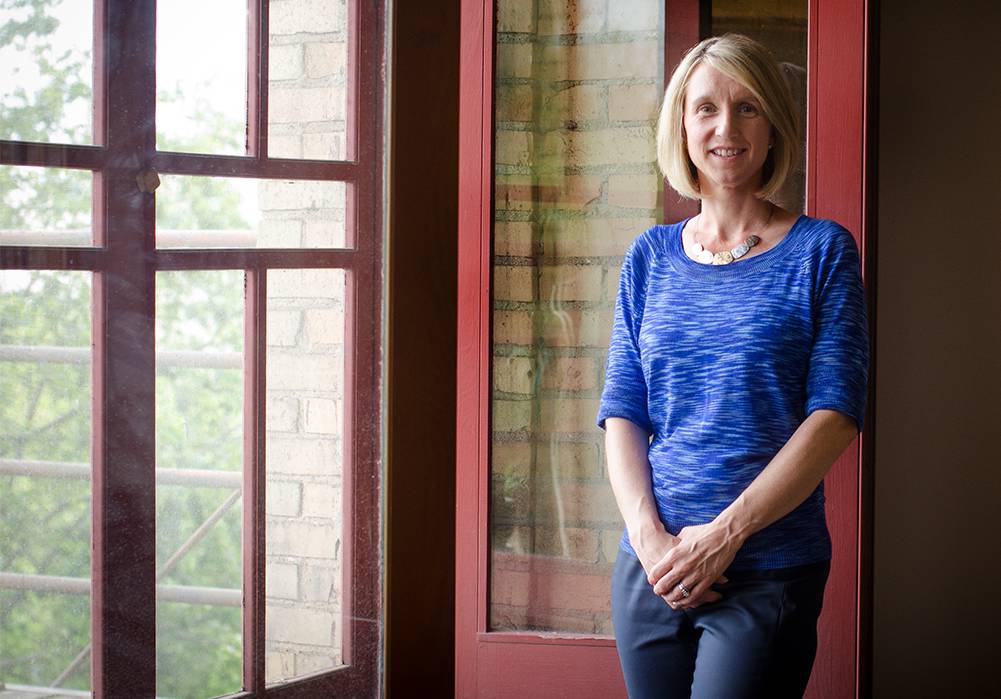In the Child Trends office in Minneapolis, Kathryn Tout, ’97, oversees national projects and projects in multiple states. The U.S. Department of Health and Human Services is one of the office’s biggest clients.
As director of early childhood research, Tout focuses on how different programs and policies affect the quality of early care and education. Right now, for example, she and her staff are researching and evaluating the effectiveness of Quality Rating Improvement Systems (QRIS), a method used across the country to assess and improve early childhood care and education programs.
Child Trends is a national nonprofit research center. It is a mission-driven organization, says Tout, working to share information with people like policymakers and early childhood practitioners. That real-world application is what she loves about her role as a researcher.
“It allows me to bring evidence and information that can change the conversation with decision-makers,” she says.
Seeking a practical impact
Even as an undergraduate, Tout knew she wanted her work to have a practical impact. Her first research experience while a student at Macalester College was inspiring, but she didn’t see the results being shared directly with parents, teachers, and lawmakers.
“I knew I liked research,” says Tout, “but I knew I did not want to be in a lab.”
Tout’s desire to make a difference through research led her to pursue a graduate degree. Many factors pointed her in the direction of the University’s Institute of Child Development, including its high ranking and advice from fellow researchers.
“Looking at the options and national reputation,” she remembers, “the University of Minnesota’s program was at the top of the list.”
At the institute, Tout earned both her early childhood education licensure and her Ph.D. in child psychology. Working with Regents Professor Megan Gunnar, she was inspired by Gunnar’s ability to translate research on children’s psychobiological stress to practitioners and the public. During the same period, she completed a year-long fellowship at the University of Chicago, where she earned a master’s degree in public policy.
Tout graduated from all three programs in 1997 and soon went to work at Child Trends in the Washington, D.C., area. She spent her first three years at its home location, but her future husband was a faculty member in the health sciences at the University of Minnesota. She didn’t want leaving Washington to mean leaving Child Trends, so she and her mentor agreed to give long-distance work a try.
Fifteen years later, Tout directs research at what is now the well-established Minneapolis branch of Child Trends. In the North Loop office, she and a team of researchers collect and analyze data on the features of childhood programs that support young children’s development.
When she started on her doctorate, Tout didn’t know that the very relevant, applied research she does today was one of the opportunities a doctoral program in child psychology would afford her. She wants current and prospective students to know how the child development program prepares students for a wide range of meaningful careers and opportunities.
Energy from the challenge
Before Tout found her place in applied research, a deeply rooted passion for early childhood work sparked her interest. The passion continues, though the work itself is continually changing.
“One of the things I love about Child Trends is that our research interests follow what we see in the field,” says Tout. “Our research agenda is always shifting to take into account what’s going on in real life.”
Tout and her colleagues are dedicated to sharing research in practical and influential ways. But research evidence is just one of the elements in early childhood policy decisions, where factors like financial resources play a big role. The nature of political and educational systems makes creating change in early childhood practice one of the biggest challenges.
“We have the tools to be able to support change, but it’s hard to make that change happen,” says Tout, who is energized by the challenge. “It still feels really exciting.”
Learn more about the Institute of Child Development and about Kathryn Tout and Child Trends.
Story by Ellen Fee | June 2015
